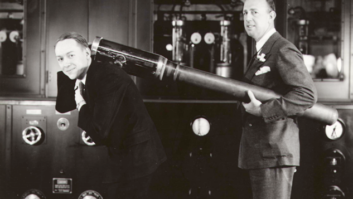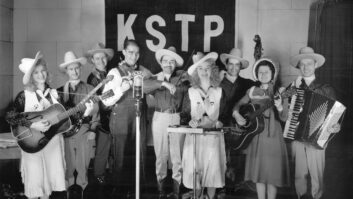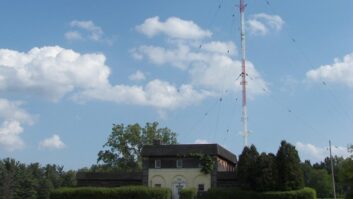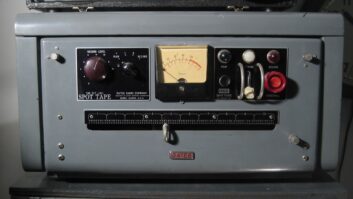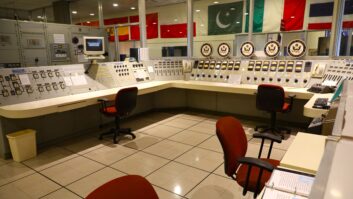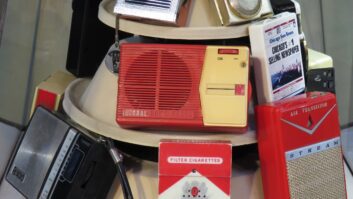
The task force wants to learn “how much is ‘out there’ on a local station basis — especially recordings of all or part of a ‘typical’ broadcast day.” It also wants to identify audio collections in danger of being lost.
Credit:
iStockphoto/Wittelsbach bernd How to save radio’s audio history? A big group of media history faculty, plus staff at the Library of American Broadcasting, is trying to help.
The Radio Preservation Task Force calls itself the first national radio history project of the Library of Congress; it grew out of the Library’s ambitious National Recording Preservation Plan. I wrote earlier about the radio-related aims of the overall plan; see http://tinyurl.com/mulxa9u.
The task force says radio is “perpetually declared to be a dying medium” but nevertheless attracts dedicated listeners and commercial and public support. The organizers believe radio’s history is a chronicle of our country’s culture and a potential trove for historical researchers, but that much of it is “untapped” because of radio’s live nature and problems of accessibility to content.
The task force is particularly interested in assessing the extent of recorded radio history beyond the relatively well-documented “golden age” of radio. This means “local, regional, noncommercial and under-represented movements in broadcasting history.”
Surveying the landscape of radio materials will involve use of metadata analytics and the development of research “caucuses” made up of faculty specialists and state university archivists.
For someone outside of academia, this all may sound somewhat dry. But what it means is that people who care about American radio in all its forms are trying to help both researchers and average Joes put our hands on the recorded material of everyday life in our medium, now and in the future.
The task force is led by broadcast historian Christopher Sterling, who is an associate dean at George Washington University and a member of the Library of Congress advisory group to which the new task force reports.
Seeking to learn more, I emailed with him and his colleague Josh Shepperd, assistant professor of media studies at Catholic University, who is research director for the task force and handles day-to-day operations.

Christopher SterlingWhen I saw the recommendations in the National Recording Preservation Plan, I found myself thinking that it’d be almost impossible to try to aggregate archived material consistently, given the lack of any organized effort in the past. Where do you start a job this big? It sounds monumental.
Sterling: Our intent is not to aggregate collections, but rather to ease access to them — by developing a consistent “directory” — its format not yet determined — to ideally provide “one-stop shopping” for radio researchers. Naturally, collection standards vary, and some archive finding aids are wonderfully detailed while others are less so. Our job is to ease the researcher’s job by giving her or him enough to know whether to pursue that source.
Shepperd: It seems like a pretty ambitious goal, for sure. We’re starting with state archives and library scientists, and working our way to historical societies, branch libraries and eventually personal collections. Our working principle is that no local radio history is too small. As Chris pointed out: We’re aggregating archive participation, but not their recordings. All materials located by the task force will remain in current hands without exception.
Other than certain recordings of “Dragnet” and “The Lone Ranger” and so on, my personal experience is that our industry in general has been pretty mindless about saving its heritage. Media storage over the years also could be costly in terms of dollars and shelf space. How will you go about identifying and securing material that is “off the radar,” even within our industry?
CS: Excellent question and a daunting one, too. Best known and widely available are the network programs of the “old-time radio” era (chiefly 1930–50), which are not our focus. We are trying to determine how much is “out there” on a local station basis, especially recordings of all or part of a “typical” broadcast day. And we care about both commercial and educational/public stations. Plus syndicated programs and series. There is very little known about how much material may exist. We also want to identify collections that may be at risk — about to be pitched, those with poor or no finding aids, those on older media that may need rescuing, etc.
JS: The goal of the project is less to secure materials than map if and where local and noncommercial radio recordings might exist. The next goal is to devise strategies with the Library of Congress, research librarians and digital archivists, to increase accessibility, preservation activities and the study of radio.

Josh ShepperdI’m envisioning a lot of reel-to-reel tapes from the 1960s and 1970s sitting on shelves, with its audio content “printing through.” What’s the biggest challenge from a media preservation standpoint?
CS: We have the same nightmares; and the cost of redubbing things or otherwise saving such material could be huge. As the project develops, we may be able to identify potential funding sources interested in local or regional recordings. But that’s a later step.
JS: I have a feeling that some of the biggest challenges are yet to come — usually these materials aren’t quite as fragile and in danger of disintegration as early film, a topic that has received important attention from preservationists this past year. But the sheer breadth and depth of the recordings that we’re just starting to unearth will require a lot of planning once we move into the cataloging, digitization and research phase of the project.
Do you expect local, commercial radio stations to be an important source of material? I suspect that archive preservation will be inconsistent locally, is that reasonable?
CS: I think you are absolutely right — few stations, especially those with numerous ownership changes in recent years, will have saved much if anything. I can hope commercial outlets will have material, but I have my doubts …
JS: Yes, station broadcasting collections, which are managed differently than broadcasting archives at universities, are a major object of interest for the task force. We’re trying to cut our search off at 1925–1975 for now, which means we’re dealing with stations with pretty long histories. Unfortunately in some cases these stations either trashed or incinerated their audio histories when they moved locations. In other cases stations saved everything. For example, one of our research associates just unearthed 15,000 lacquer discs at a prominent East Coast station. How we might eventually digitize and preserve these recordings will be a major topic of discussion in 2015.
Your announcement mentions analyzing collections to create a “national finding aid.” What is that?
CS: It’s a combination of a user guide and a way of finding what is where. Years ago, this would have been a published book, which would “freeze” a “snapshot” of what was known when it appeared. Today, of course, such things are online and constantly updated.
But we have not yet nailed down all the details on this — we are still in the exploratory stage. For example, folks working with us (chiefly academics) have already found more than 100 archives with some radio holdings. And that’s after less than two months’ effort. We are betting there could be 200–300 or so.
And you’ve mentioned a planned radio history conference at the Library of Congress next fall.
CS: First, it’s not yet a done deal, as conferences have costs. Our hope and intent is that early in 2015 we can announce details of a day-long or two-day conference in Washington where discussion would center on what we’ve discovered in a year of looking and assessing, and how best to proceed in a way valuable to the most potential users. Most attendees would likely be academics interested in radio’s history and archive experts. The idea would be to share what’s been learned, overcome problems that have arisen and get still more people interested.
Radio World readers include many with a love for both technology and history. What else should they know?
CS: We are very interested in hearing from stations that may have material (or perhaps have donated some to a nearby archive or historical society). At this very initial stage, we are interested in any comments, suggestions and critiques.
JS: Our relationship to radio is more than just one of an object studied. We really care about this history. A huge percentage of our faculty research associates are radiophiles, worked in the industry or started in college radio. Chris was trained as a radio broadcaster, for example.
Jack Mitchell, professor at University of Wisconsin-Madison, founder of “All Things Considered” and an Edward R. Murrow Award winner, recently said to me that Chris had one of the best radio voices of his generation at Wisconsin Public Radio.
Comment to me at [email protected].
The Radio Preservation Task Force welcomes your help and suggestions. They’re on Twitter @radiotaskforce or email [email protected].

